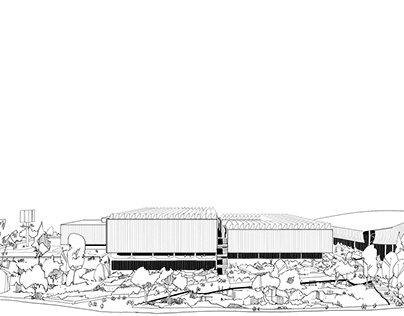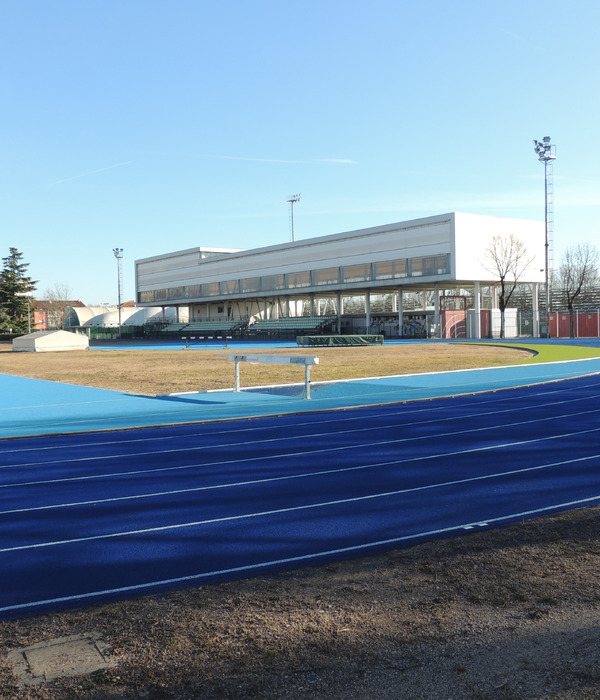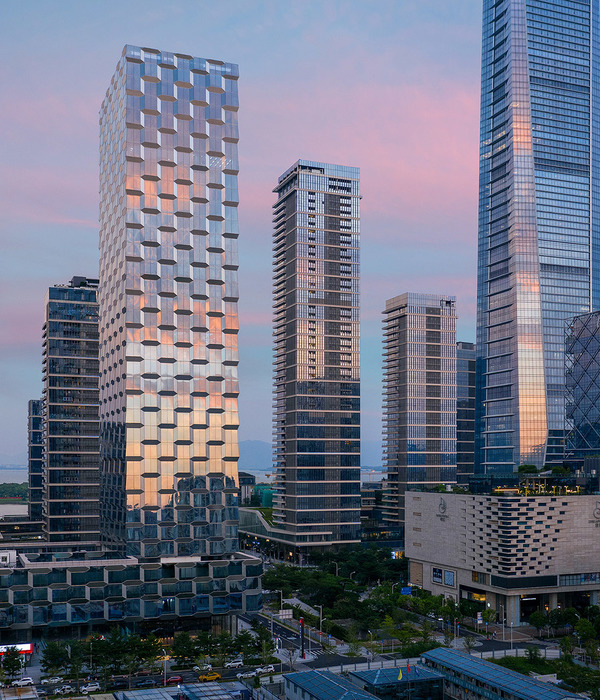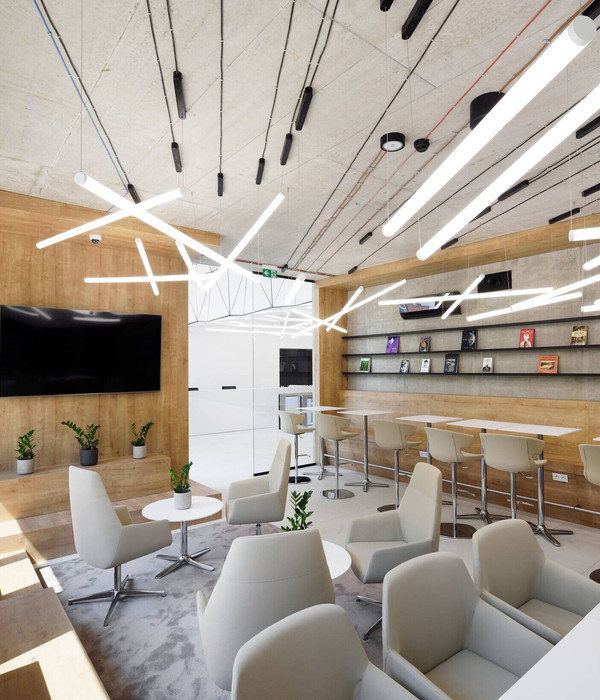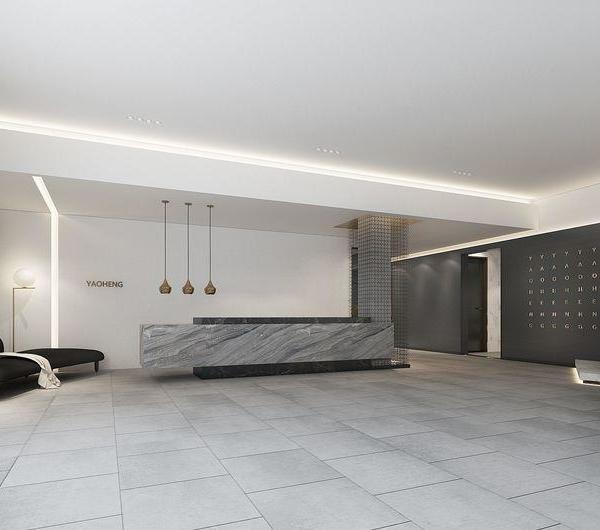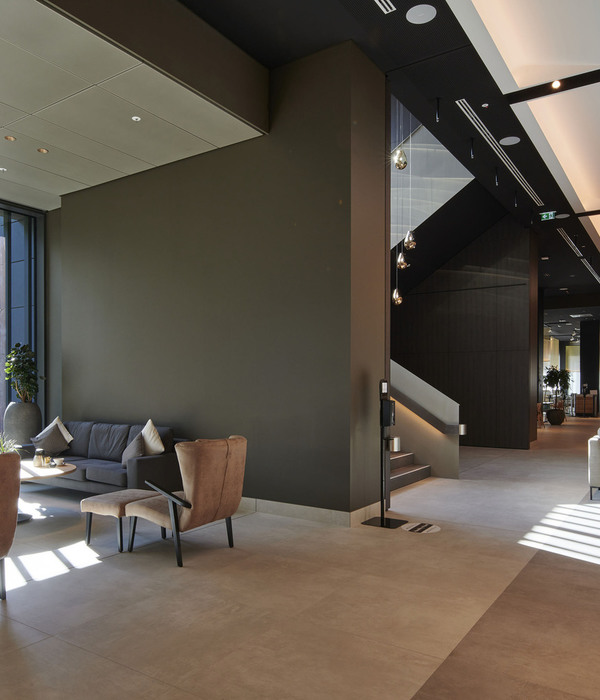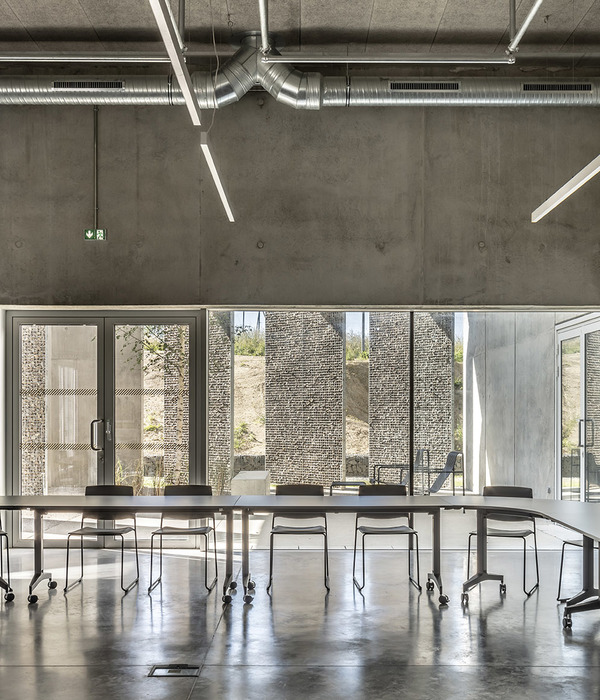建筑并非功能、形式等各方面的简单加和,而是与时间、场地和使用者相结合的有机整体。建筑师应通过设计,营造出与当下设计思想、建造技术和材料相符合,与当地文化和地理环境相适应,为人的活动模式而设计的建筑和景观,并诠释营造过程中设计的内涵。“关联设计”思想贯穿于倪阳工作室的设计研究当中,我们希望以此营造更美好的城市和建筑。
Architecture is not a simple sum of functions, forms, etc., but an organic whole combined with time, place and users. Through design, architects should create buildings and landscapes that are in line with current design ideas, construction techniques and materials, adapt to local culture and geographical environment, and people’s activity patterns, and interpret the connotation of design in the construction process. The idea of “Relevance Design” runs through the design research of Ni Yang atelier and we hope to create a better city and architecture.
▼项目鸟瞰,Aerial view © 章鱼见筑
西青光大垃圾焚烧发电厂位于天津市西青区,位于星耀五洲旅游度假村南侧,天津中塘工业区西北侧,场地西侧有洪泥河流过。
Xiqing Guangda Waste-to-energy Plant is located in Xiqing District, Tianjin, on the south side of Xingyao Wuzhou Tourist Resort, on the northwest side of Tianjin Zhongtang Industrial Zone, and on the west side of the site is the Hongni River.
▼河岸视角,View from the riverside © 章鱼见筑
方案运用线性流动的设计语言消除工业建筑冰冷沉重的工业感,“行云”与“流水”的设计意向也为垃圾焚烧发电厂平添了轻盈与灵动的气质。洁白的体量,流动的曲线配以简洁有力的立面开窗线条成为天津城市远郊的一抹风景。
The design uses the design language of linear flow to eliminate the cold and heavy industrial feeling of industrial buildings, and the design intention of “moving clouds” and “flowing water” also adds lightness and agility to the Waste-to-energy Plant. The clean white volume, flowing curves and simple and powerful façade opening lines have become a touch of scenery in the outer suburbs of Tianjin.
▼主立面:线性流动的设计语言,Main facade: a design language of linear flow © 章鱼见筑
垃圾焚烧发电厂作为城市生活紧密相关的工业基础设施,其造型却极少被关注。伴随着人们日渐提高的环保意识,同时为了公众更好的了解环保产业,垃圾回收处理焚烧的工艺处理流程作为展示对象向公众开放,因而对垃圾焚烧发电厂立面造型的“公建化”改造提升显得尤为重要。
As an industrial infrastructure closely related to urban life, Waste-to-energy Plants have received little attention. With people’s increasing awareness of environmental protection, and in order to better understand the environmental protection industry for the public, the process of waste recycling and incineration is open to the public as a display object, so the “public construction” transformation of the facade of waste incineration power plants promotion is particularly important.
▼从景观水池望向建筑,View from the landscaped pool yard © 章鱼见筑
垃圾焚烧发电厂因其特殊的工艺处理流程以及设备生产空间,体量尺度巨大,同时,功能体量也相对明确。此类生产工艺主导的项目以生产工艺流程为核心,在进行立面改造设计时,采用容易调整的形式来贴合工业建筑本身的形体。西青光大垃圾焚烧发电厂是有三组焚烧发电生产工艺组以及控制间配电室组成,在体量上形成前后小大的形体组合,立面上大体呈现出“两层”的高度关系,总长度约为165米,总宽度约为81米,体量巨大。虽然体块限制较大,但立面仅作为外围护结构,采光可选用顶面采光形式。
▼生成分析,Process © 倪阳工作室
Due to its special process flow and equipment production space, the waste incineration power plant has a huge volume and a relatively clear functional volume. This type of production process-led project takes the production process as the core. When designing the façade, an easily adjustable form is used to fit the shape of the industrial building itself. Xiqing Guangda Waste-to-energy Plant is composed of three groups of incineration power generation production process groups and the control room power distribution room, which form a combination of front and rear small and large shapes in terms of volume. The length is about 165 meters, the total width is about 81 meters, and the volume is huge. Although the volume restriction is relatively large, the façade is only used as an outer protective structure, and the top lighting can be used for lighting.
▼流动的曲线配以简洁有力的立面开窗线条,Flowing curves with clean, strong window opening lines on the façade © 章鱼见筑
▼立面近景,Facade detailed view © 章鱼见筑
设计首先基于原厂形态进行方盒体量的贴合,通过体量的切割,形成更次一级的体量尺度,打破原有的“大”尺度体量组合,形成“中”尺度以及“小”尺度的体量层次,立面上形成三个层级的尺度组合关系,同时,对立面转折部分选用了圆角的形式,弱化体量;开条形窗,使得立面增添灵动的气息。设计手法与中国传统剪纸工艺别无二致,仿佛用剪刀将一张银白色的立面塑造出连绵不断,流动连续的艺术效果。同时考虑第五立面的设计造型,延续了立面的线性条窗,形成秩序排列。
The design is first based on the original shape of the box to fit the volume. Through the cutting of the volume, a next-level volume scale is formed. The volume forms a three-level scale combination relationship on the facade. At the same time, the turning part of the opposite side adopts the form of rounded corners to weaken the volume; the strip windows are opened to add a flexible atmosphere to the facade. The design method is no different from the traditional Chinese paper-cutting process, as if using scissors to shape a silver-white facade into a continuous, flowing and continuous artistic effect. At the same time, considering the design and shape of the fifth facade, the linear strip windows of the facade are continued to form an orderly arrangement.
▼立面转折部分选用圆角的形式 © 章鱼见筑 The turning part of the opposite side adopts the form of rounded corners
▼立面细节,Facade detailed view © 章鱼见筑
设计在节制,尽量减少不必要装饰造成浪费的原则之下,通过连续的波纹板,以及条形窗对体块进行了尺度层级的丰富。立面的主要材料选用了成本较低,环境污染较少同时工业建筑较多使用的弧形竖向波纹彩钢板建筑材料,该材料本身具有易弯折的特性,利于实现弧线条造型语言,更好的诠释统一的形式语言;同时,彩钢板作为工业建筑常见的材料其耐候性较好,便于清洁维护。
The design is based on the principle of restraint and minimize the waste caused by unnecessary decoration. The volume is enriched by continuous corrugated boards and strip windows. The main material of the façade is the arc-shaped vertical corrugated color steel plate building material, which has low cost, less environmental pollution and more industrial buildings. Better interpretation of the unified formal language; at the same time, color steel plate, as a common material in industrial buildings, has good weather resistance and is easy to clean and maintain.
▼立面主要采用弧形竖向波纹彩钢板 © 章鱼见筑 The main material of the façade is the corrugated color steel plate
在充分尊重能源发电厂原有工艺流线的前提下,立面尽可能贴合功能体量;与所处地域自然生态环境,人文环境建立关联,提取设计符号,创造极具地域特色的工业建筑形象;关注使用者的体验与感受,坚持以人为本的理念,这是关联设计思想的又一次理论实践。
Under the premise of fully respecting the original process flow line of the energy power plant, the façade fits the functional volume as much as possible; establishes a relationship with the natural ecological environment and human environment of the region where it is located, extracts design symbols, and creates an industrial building with regional characteristics Image; pay attention to the user’s experience and feelings, adhere to the concept of people-oriented, this is another theoretical practice of Relevance Design.
▼发电厂内部,Energy power plant © 章鱼见筑
天津西青光大垃圾焚烧发电厂肩负净化城市的重任,同时应以一个积极的建筑形象出现在城市公共生活之中,向公众更好普及环保事业,因而需要建筑师进行更多的设计思考去塑造兼具功能实用与美观的工业建筑。在厚重中找寻到设计的飘逸之感,正是天津西青光大垃圾焚烧发电厂立面升级改造的鲜明特征。
Tianjin Xiqing Guangda Waste-to-energy Plant shoulders the important task of purifying the city. At the same time, it should appear in the urban public life with a positive architectural image, so as to better popularize environmental protection to the public. Therefore, architects need to make more design thinking to shape Functional and beautiful industrial buildings. It is the distinctive feature of the upgrading of the facade of Waste-to-energy Plant to find the elegant feeling of design in the heavy weight.
▼傍晚的发电厂,Exterior view in the evening © 章鱼见筑
▼傍晚鸟瞰,Aerial view © 章鱼见筑
▼平面图,Plan © 倪阳工作室
▼立面图1,Elevation 1 © 倪阳工作室
▼立面图2,Elevation 2 © 倪阳工作室
▼剖面图,Section © 倪阳工作室
▼项目更多图片
{{item.text_origin}}


